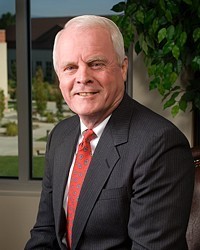 In the sixty-seventh year of his life, Russell Herman left this earth. That was back in 1994. In the “last will and testament,” this Illinois man claimed to bequeath the following:
In the sixty-seventh year of his life, Russell Herman left this earth. That was back in 1994. In the “last will and testament,” this Illinois man claimed to bequeath the following:
• More than two billion dollars to the town of Cave-In-Rock
• More than two billion dollars to the city of East St. Louis
• About one and one half billion dollars for projects in Illinois
In a final act of what seemed like unprecedented generosity, he claimed he wished to leave six trillion dollars to the Federal Reserve to pay off the national debt (as it was at that time). His was a generous will. There was, however, a very significant problem. At the time of his death, Mr. Herman possessed only one actual piece of property: a “1983 Oldsmobile Toronado” automobile. He had no other assets to cover his bequests. He left this earth leaving us with a clear reminder: None of us can give away what we don’t possess.
His promises fell short because his resources couldn’t back up his desires. Does that sound familiar?
Today, Jesus followers will gather in churches around the world. Some will pass on platitudes like: “God is as good as His promises – and they can be counted on.” Yet, if you ask different believers, you will get a very different list of what God actually promised to do for us. Truthfully, in the years I have ministered to people, I have met a number who became deeply embittered in their lives because promises they heard from believers in the name of God didn’t come through for them. Some of these walked away from the faith for a time, believing that God was either unable (insufficient) or unwilling (cruel) to do what they were told He promised. The real problem was: Someone misrepresented (either intentionally or through error) what God actually said. That is a key reason why knowing the Word well is so tremendously important. The role of an ambassador is to represent the words of the leader properly – and, I suspect, the church has paid too little attention to our role as ambassadors.
Let’s make sure we understand the definitions of the problem. God’s promises are the assured assertions from His Word that He will act in a certain way. God’s commands are demands that press us to do what we should. While His promises are to be believed and trusted, they share with us something He will do. At the same time, His commands must be followed because they demand something from us. Some promises are conditional, but when understood carefully, God never over-promises or under-delivers. Sadly though, His promises can be misrepresented by His followers. That is to say, it is possible to falsely or mistakenly exclaim a “promise” in the name of God.
In fact, we can misrepresent the Word so badly that people will scorn God because He will appear to “let them down” – when someone offered promises in His name He never agreed to make.
Fortunately, we have God’s Word to clear up what He did and didn’t actually promise. In particular, we have in this lesson a good model we can trace inside the Biblical story of Jacob. Here is the truth that will become clear as you read the account in Genesis 29-31.
Key Principle: While God’s presence and promises won’t exempt believers from troubles, they will offer both a constant companion in troubled times and an ultimate understanding of the place of troubles.
Six things God didn’t promise:
In this lesson, we want to trace what happened after Jake began a walk with God. He met God on a journey, and God’s promised presence with Jake didn’t do six things that some people confuse as promises in God’s name:
First, the promises and presence didn’t remove all uncertainty about how to move forward; yet they did allow him to see God at work in his daily circumstances (29:1-14).
Take a look at Genesis 29 for a moment. It reads:
Genesis 29:1 Then Jacob went on his journey, and came to the land of the sons of the east. 2 He looked, and saw a well in the field, and behold, three flocks of sheep were lying there beside it, for from that well they watered the flocks. Now the stone on the mouth of the well was large. 3 When all the flocks were gathered there, they would then roll the stone from the mouth of the well and water the sheep, and put the stone back in its place on the mouth of the well. 4 Jacob said to them, “My brothers, where are you from?” And they said, “We are from Haran.” 5 He said to them, “Do you know Laban the son of Nahor?” And they said, “We know him.” … 9 While he was still speaking with them, Rachel came with her father’s sheep, for she was a shepherdess. 10 When Jacob saw Rachel the daughter of Laban his mother’s brother, and the sheep of Laban his mother’s brother, Jacob went up and rolled the stone from the mouth of the well and watered the flock of Laban his mother’s brother. 11 Then Jacob kissed Rachel, and lifted his voice and wept. 12 Jacob told Rachel that he was a relative of her father and that he was Rebekah’s son, and she ran and told her father. 13 So when Laban heard the news of Jacob his sister’s son, he ran to meet him, and embraced him and kissed him and brought him to his house. Then he related to Laban all these things. 14 Laban said to him, “Surely you are my bone and my flesh.” And he stayed with him a month.
It happened that as Jacob followed the trail with the directions he was given, he ended up at the right well, at a perfect time to ask about his family. He came to the place just before the beautiful daughter of Laban (who would captivate his eyes for the rest of his days) happened to be walking up. For the one who doesn’t know God, such moments seem like a coincidence. For the one who does know God, there is providence.
Even a young believer like Jake couldn’t miss God’s hand in his life. He asked questions and watched the scene unfold. At the same time, you don’t get the sense that he knew where things were heading that day. The questions reveal there was uncertainty. He knew what he was supposed to be doing there, but he wasn’t sure this was the place, and these were the people.
From time to time I hear people say things like: “I knew it was the Lord, because everything dropped into place.” I know what they mean. When the Lord is working on something, often I find a “flow” that just overtakes the situation. As fast as a problem arises, a solution appears. I have seen it many times.
At the same time, that isn’t a promise of God.
While providence of God is a promise, a smooth ride is not. We must not infer that God has eliminated from a believer the sheer uncertainty of earthly life. The Bible doesn’t include absolute certainty about our next move, even in the pursuit of following Him.
You and I don’t know the next problem we will face, or obstacle that will challenge us, and we are misrepresenting God if we act as though He has promised to make our paths ever-clear. He has not. In fact, if you look carefully in the Word and consider the second mission journey of the Apostle Paul, you will note that before the Macedonian man vision, he didn’t know what direction he was going next in a mission journey! Even a mission trip isn’t promised to always go smoothly.
The promise God made us is that he would “never leave us nor forsake us.” The prize of His presence doesn’t accompany unending bliss and certain turns of the road in this life. God didn’t promise to remove my troubles, He promised to insert His presence into my life through all my troubles. The abundant life we have is wrapped in the delight of facing daily life with the powerful and loving Companion. We aren’t exempted from pain; He joins Himself to us and bears it with us. Our rest is in His goodness, not in life’s fairness.
Second, the promises and presence didn’t remove all the drudgery from life; they did provide a sense that God was working things out as Jake worked hard (29:15-20).
Providence isn’t an excuse for lying in a hammock and blaming God for your unemployment. Providence assures a companion while you labor, sometimes pushing twenty pounds of paper reports off your desk, or lifting heavy boulders and clearing them from your field. Look at what Jake did:
Genesis 29:15 Then Laban said to Jacob, “Because you are my relative, should you therefore serve me for nothing? Tell me, what shall your wages be?” 16 Now Laban had two daughters; the name of the older was Leah, and the name of the younger was Rachel. 17 And Leah’s eyes were weak, but Rachel was beautiful of form and face. 18 Now Jacob loved Rachel, so he said, “I will serve you seven years for your younger daughter Rachel.” 19 Laban said, “It is better that I give her to you than to give her to another man; stay with me.” 20 So Jacob served seven years for Rachel and they seemed to him but a few days because of his love for her.
While we may all tempted to say: “Awwww” over the last sentence as we contemplate Jake’s infatuation with Rachel, that isn’t the whole point being made in the passage. Jake worked for seven years. He got up early, took care of the flocks and herds, and dropped on his mat at the end of a long, hot, day. Just because we read it in a simple sentence, didn’t mean it wasn’t arduous, sweaty work.
Was God with him? Yes! Did that mean he could sleep in and coast in life and still get ahead? No! The promise of God’s presence and even the promises of God’s specific blessing were not to be construed with some “get out of work free” card that Jake could play. Your promises aren’t either. From the moment God began speaking to Adam, the instructions sounded like a job – because we were created to find resolution and completion in work. It doesn’t matter whether it is manual labor or computer programming – the work may be long and tedious – but it is accompanied by God’s presence and His stamp of blessing deep within.
Third, the promises and presence didn’t exempt Jake from being cheated by those around him; yet God stayed beside him and worked in spite of it all (29:21-30).
It would be great if I could promise you that lightning wouldn’t strike your transformer and your back wouldn’t go out because you love and follow Jesus – but teaching that would also be a misrepresentation of God’s real promises. Add to that, you might work hard and be honest, and a lie by a jealous and conniving co-worker could still put you in the unemployment line. How do I know? Look back at our story…
Genesis 29:21 Then Jacob said to Laban, “Give me my wife, for my time is completed, that I may go in to her.” 22 Laban gathered all the men of the place and made a feast. 23 Now in the evening he took his daughter Leah, and brought her to him; and Jacob went in to her. … 25 So it came about in the morning that, behold, it was Leah! And he said to Laban, “What is this you have done to me? Was it not for Rachel that I served with you? Why then have you deceived me?” 26 But Laban said, “It is not the practice in our place to marry off the younger before the firstborn. 27 Complete the week of this one, and we will give you the other also for the service which you shall serve with me for another seven years.” … 30 So Jacob went in to Rachel also, and indeed he loved Rachel more than Leah, and he served with Laban for another seven years.
This famous tale in the Bible offers us an easily overlooked point: Jake got played even though he did what was right and was following God’s plan. Let that sink in for a moment.
God never promised believers they would get full and complete justice here on Earth. He does claim that He keeps perfect score. He does promise to heal our wounds and to punish evil men and women. What He DOES NOT PROMISE is short-term satisfaction and a certainty of outcome before eternal judgment after this life. He promises ultimate justice, but not immediate justice.
God never promised believers a life of comfort provided by the conditions here on Earth. Though some believers may experience material prosperity and success, it is a terrible assumption that God will apply that to all and give us an easy life. We don’t all have the same call, even though we all have the same God. We differ in gifts and we differ in what God intends to do in and through us.
I think often about the words of Jesus in relation to my personal expectations – and I have to admit that I have a privileged life!
John 16:33 I have said these things to you, that in me you may have peace. In the world you will have tribulation. But take heart; I have overcome the world.”
The peace I have is IN CHRIST, not in comforts of this world. If I get material prosperity, that is in addition to His presence! Our life was not offered a guarantee of temporal comfort, but it was promised a fulfilment based on our conscious walk with the Savior. Why doesn’t God deal with wrong right now? There are many reasons. One important reason is this: God is not only patient with us; He is equally patient toward those who may choose to oppress us.
Jake got played in spite of his walk with God. Paul got stoned by evil men. Most of the disciples were executed as Apostles. If we think we are promised material prosperity, we aren’t following the bread crumb trail of the first three hundred years of Christian history.
Fourth, the promises and presence didn’t insulate him from repeating mistakes learned in his family life; but even those mistakes became a platform for God’s blessings (29:31-35).
Most of the rest of Genesis 29 tells of the earliest children born to Jake by his “runner up” wife Leah. The story unfolds as Leah tries to win his love and attention by offering her body and producing a child. It is a sad story in many respects, but one thought jumps off the page reading verse thirty-one:
Genesis 29:31 Now the Lord saw that Leah was unloved, and He opened her womb, but Rachel was barren.
Jake, who should have understood the pain involved in favoritism, played the same game in his own tent camp (among his wives) that his parents played in his upbringing. He was only ON this journey away from home because of the dysfunction that came from “ranking” relationships and picking favorites in the home. Did God’s new relationship with him insulate him from falling back into old habits? It surely did not.
Believers get a new connection to God, but have to work deliberately to distance themselves from their old thinking and habits. It isn’t a passive process. It takes WORK. It requires growing in discipline. It isn’t JUST self-effort (it requires God’s Spirit) but it INCLUDES deliberate effort.
That is the work involved in sanctification – where the Spirit of God works in you to change you to become more like Jesus – and you actively listen and respond to make course corrections in life.
Jake reminds us of one of the biggest problems we face in our Christian life – our default settings from an earlier life were not set to “holy.” We came to our relationship with God with some of the settings requiring deliberate re-set to change from the default. Liars must learn to speak the truth. Gossips must learn to curb their impulses. It takes time, and it isn’t guaranteed to fall off of us because we now know God any more than our extra weight put on in living an excessive life before we knew Him.
Fifth, the promises and presence of God didn’t guarantee peace and quiet in Jake’s home life; but it did provide him a way to cope with people disappointments (30:1-43).
For time sake, let me simply mention that chapter thirty has two stories to illustrate this truth:
With his barren wife Rachel, Jake shared his newfound perspective that things on earth are initiated in Heaven (30:1-24). When Rachel complained to Jacob, he immediately made clear that he wasn’t the responsible party – God made babies. (Obviously, there is collaboration!) You cannot help but notice, particularly in Genesis 30:14ff, how his wives thought mechanistically about pregnancy, but Jacob knew the matter was ultimately in the hands of God. Jake’s answer wasn’t a “cop out;” it was the truth. He could participate in the process, but God had to make it chemically work.
In the case of Laban’s trickery later in the chapter, Jake clearly didn’t have an exemption from undergoing real tests by a man who was dishonest (see Genesis 30:25-43); yet the vices of his boss didn’t thwart God’s ability to advance Jake. Jake saw God bless him even when his boss was trying to stiff him from a prosperous future. Note the summary verse:
Genesis 30:43 So the man became exceedingly prosperous, and had large flocks and female and male servants and camels and donkeys.
It is true that Jake furthered in material prosperity, but the point I want us to see is that problems kept rolling in, despite his walk with God. There is one more…
Sixth, the promises and presence of God didn’t keep Jacob from facing jealousy about his life; but it did offer him God’s direction from His Word (Genesis 31:16).
Chapter 31 opened with:
Genesis 31:1 Now Jacob heard the words of Laban’s sons, saying, “Jacob has taken away all that was our father’s, and from what belonged to our father he has made all this wealth.” 2 Jacob saw the attitude of Laban, and behold, it was not friendly toward him as formerly. … 6 You know that I have served your father with all my strength. 7 Yet your father has cheated me and changed my wages ten times…”
I count three things that were mentioned: lies, unfair attitude and wage cheating. Does that sound like Jake was sailing through life unscathed by the pain of others? No, it does not. Yet, let’s end with the positive. Let’s listen to how Jake framed his life after he got a walk with God. He said:
Genesis 31:7b …however, God did not allow him to hurt me. 8 If he spoke thus, ‘The speckled shall be your wages,’ then all the flock brought forth speckled; and if he spoke thus, ‘The striped shall be your wages,’ then all the flock brought forth striped.
First, Jake knew Laban didn’t set fair contests, but didn’t control the outcome alone.
The table may have been rigged, but God still controls the laws of the physical world. Remember this: no matter where you are, no matter who thinks they are in charge, no matter how unfair the plot… God is still there. He hasn’t left you. He will do what He promised when it tells His story in the most complete way possible. That won’t guarantee you will always feel good about circumstances, but it will quench the burning within that injustice will prevail. It won’t.
Listen as he finished his words:
Genesis 31:11 Then the angel of God said to me in the dream, “‘Jacob,’ and I said, ‘Here I am.’ 12 He said, ‘Lift up now your eyes and see that all the male goats which are mating are striped, speckled, and mottled; for I have seen all that Laban has been doing to you. 13 I am the God of Bethel, where you anointed a pillar, where you made a vow to Me; now arise, leave this land, and return to the land of your birth.’”
Second, God didn’t offer promises and walk off the set of the drama.
He stayed in Jake’s life, interacting with him and speaking into the dark moments. God’s providence is about His continual presence with us, not about a peaceful and idyllic journey through fields of bliss. You don’t always find God by peaceful streams. Sometimes He meets you in the lion’s den or the fiery furnace. The point is: If YOU are there, HE is there. He hasn’t lost track of you.
God’s hand wasn’t only obvious to Jake, but also to those around him. If Jake groused, complained, barked and fussed – they wouldn’t see that blessing. God let Jake know He was there, and Jake reflected that to those closest to him. Listen to what one of his wives said to him:
Genesis 31:16 Surely all the wealth which God has taken away from our father belongs to us and our children; now then, do whatever God has said to you.
Let me ask you if you reflect God’s goodness to you so that those around you can see it. I don’t always do it – but we need to work at it! We tell people we have a walk with God and then complain about the government and our boss and our conditions in life like God isn’t still there.
Let’s be clear about God’s promises and His presence. Let’s say it the way the Word does:
God’s presence and promises don’t exempt believers from troubles; they offer His constant companionship and an ultimate understanding of trouble.
There is a word quiz where someone created a rather clever puzzle. Let me share it with you:
• What is it that is greater than God?
• More evil than Satan?
• Rich people DON’T have it?
• Poor people DO have it?
• And if you eat it… you will die?
The answer: ABSOLUTELY NOTHING
• Nothing is greater than God.
• Nothing is more evil than Satan.
• Rich people don’t have nothing; they have much.
• Poor people have nothing.
• And if you eat nothing… you’ll eventually die – skinny and sad.
The puzzle makes sense once you know the answer, but until you hear the answer, it is very confusing. That’s the case with our lesson this morning. Without the answer, the problems will confound you.
Let me offer you the answer: His name is Jesus, and He offers you His constant presence and some incredible promises.
Beloved, believers don’t keep one eye focused on Heaven out of the need for sheer escapism. We dream about our future, because it is where our Savior will be clearly seen. It is where God’s true reign will be unmasked and God deep love will be thoroughly revealed.
We will not find consolation in the justice system of a fallen world filled with liars and broken people.
We will not find peace in families that are being whipped by false views of sexuality, submission and servant-hood.
We will not find sinlessness in the gates of the church of sinners, where secrets continue and sins are carefully covered.
We will not find ultimate truth on the internet of those disconnected from their Creator.
Justice, peace, sinless splendor and truth – these are Heaven things. These are our future in Jesus. That is where we will see Him face to face.






















